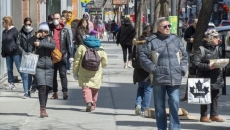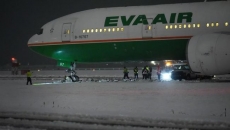Smoke is causing poor air quality and reduced visibility through northeastern and central B.C., extending into southern regions, Environment Canada says.
But a shift in weather patterns throughout the day is expected to improve conditions.
Smoke had also started spreading to the Whistler, Howe Sound and Sunshine Coast areas, causing variable but hazy conditions, the weather agency said Thursday.
It said smoke impacts may be worse at higher elevations in the Okanagan, but rain may provide some relief.
Environment Canada's air quality statement notes wildfire smoke is hazardous to health even at low concentrations, and it urges children, older people and those with lung conditions to avoid strenuous outdoor activities.
The BC Wildfire Service took to Twitter to say it's seeing reduced fire behaviour across much of the North Peace Complex.
Some areas continue to have "aggressive fire behaviour," but smoke is expected to dissipate in the coming days, it said.
Over 600 personnel are currently responding to wildfires within the North Peace Complex. The #BCWildfire IMT that has been managing this complex over the past two week will officially handover command to a new IMT this evening.
— BC Wildfire Service (@BCGovFireInfo) May 19, 2023
View the latest ops update: https://t.co/WphFFo6oGu
The service's website lists 69 active wildfires in the province.
The Peace River Regional District lifted an evacuation order for 850 properties in rural areas north of Fort St. John Thursday night, but residents must be ready to leave again on short notice.
An evacuation order remains in effect for the settlements of Buick Creek, Murdale and Mile 70 north of the city, where the 215-square-kilometre Stoddart Creek wildfire is burning about 25 kilometres away.
Above-normal temperatures, combined with drought conditions across most of the province, is increasing the potential for wildfires, the B.C. government said in a news release Friday.
"People should be prepared for wildfire and heat, have an emergency plan and stay informed as conditions change," it said.
"Since April 1, more than 220 wildfires have burned more than 135,000 hectares, largely within the Prince George Fire Centre. Of these fires, 85 per cent were human-caused and were preventable."
Large, open burning has been banned across B.C. in an effort to prevent human-caused wildfires.
Starting Friday, all open fires, including campfires, will be prohibited throughout the Prince George Fire Centre. The area spans much of northeastern B.C., including Fort St. John, and is where all four out-of-control wildfires are located.
Campfires elsewhere in the province have to be confined to 0.5 metres in height and 0.5 metres in diameter, with water kept on hand to douse the flames.
The government has also warned that a return of seasonal spring conditions is also increasing the potential of lightning-caused fires. The BC Wildfire Service is closely monitoring the changing conditions, it said.






